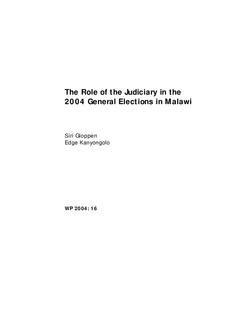| dc.description.abstract | The courts in Malawi have played a prominent role in political life since the democratic transition in 1993, which came about after three decades of repressive authoritatian rule. Whilst the quality of electoral politics have deteriorated, the courts have become increasingly central. In the 2004 elections they were involved at every stage of the election process. In this paper we argue that the Malawian judiciary has assumed four politically significant functions in the electoral process: it performs an accountability function, acts as a safety-valve, plays the role of an internal arbiter for the political parties; and functions as a source of political leverage. Furthermore, we argue that in order to understand this increasing politicisation of Malawian politics, it is important both to look at what has prevented the government from reigning in the judiciary, what has motivated judges to take up such a role, and what has motivated the parties to lodge political cases in the courts. | |
